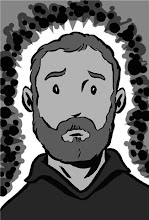An industry veteran with more than twenty years experience in books, comics and audio plays, Dan Abnett has written for high-profile publishers like Marvel, DC, 2000AD and Games Workshop. His most successful creations to date include 2000AD's Sinister Dexter and Games Workshop's Eisenhorn trilogy.
PLM: How long had you been writing before you made your professional debut with Marvel UK.
DA: I’d always done it as a kid and a teenager. It was my ‘hobby’ - writing stories and drawing pictures (or doing both at the same times a hand drawn comics).
PLM: Whilst you’ve enjoyed very obvious success since then, were there darker days when it wasn’t apparent where the next cheque was coming from? How did you deal with these fallow periods?
DA: When you’re a freelancer, there are always tight times, especially in the early days. You work through them. You use the time to develop possible material of your own, and you pound shoe leather (metaphorically, usually, but on the phone and email) to develop contacts and find new lines of commission.
PLM: You now work for a variety of publishers including Marvel, DC, Rebellion and Games Workshop. Is it challenging switching genres and disciplines to meet the needs of these diverse employers?
DA: Yes, it can be, and it might not suit everybody. I find it keeps me fresh, and allows me not to get ‘stuck’ into one thing for so long it goes stale. Variety, as they say, is the spice of life...
PLM: With reference to your forthcoming titles from Angry Robot, how does working on our own original fiction differ from working on titles in a pre-defined universe like Games Workshop’s?
DA: It’s not all that different, actually, you simply have to set the rules yourself rather than follow someone else’s. It’s still a set of rules to work by, and it’s still a world that’s got to function and operate properly.
PLM: Finally, you’re a very prolific writer. Can you tell us an insight into how much time you spend at your desk each day to make your deadlines? And what do you do if you find your flow interrupted by, say, writer’s block or illness?
DA: I get to my desk between six and seven, work through until a lunch around twelve-thirty, and then again through until about six. Sometimes I do a morning or afternoon during a weekend too. I used to pull evenings and all-nighters, but I gave that up because I never used to see any of my family. It was also not a good idea getting over-tired when my epilepsy kicked in (I developed late-onset epilepsy last year). Writer’s block you simply have to write through. It may be something else you write to get the cogs moving, but that’s the only way.
PLM: Thank you very much indeed, Dan.
Dan Abnett's first work of original fiction, Triumff: Her Majesty's Hero was released in 2009 by HarperCollins' Angry Robot imprint. You can keep up to date with all Dan's future releases at both his website, and his blog.

If you have enjoyed this blog, please consider making a donation to my preferred charity, the Myasthenia Gravis Association. Thank you.












